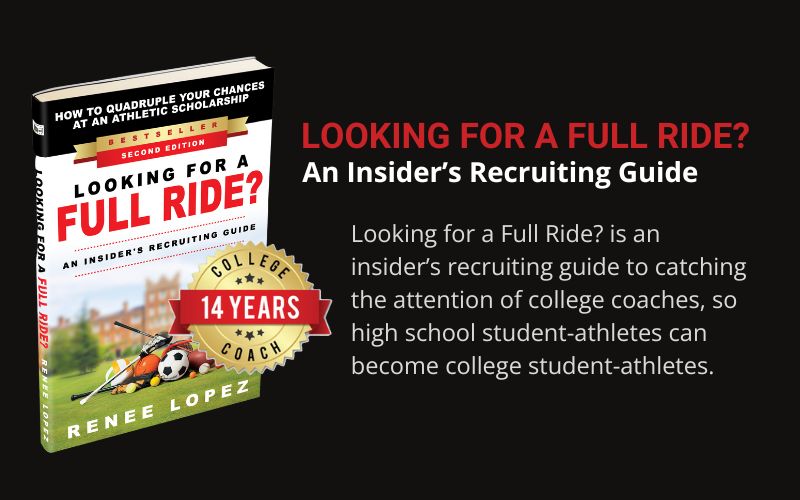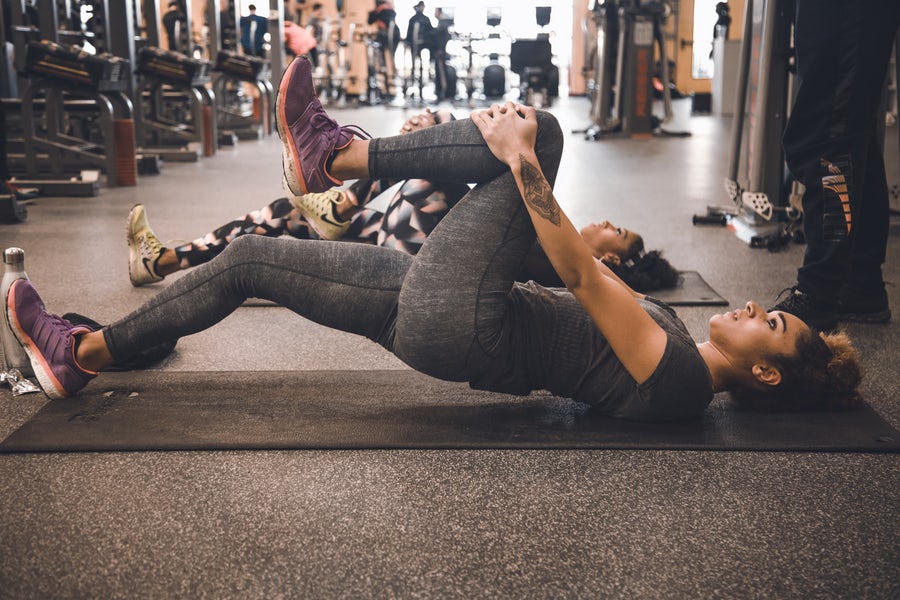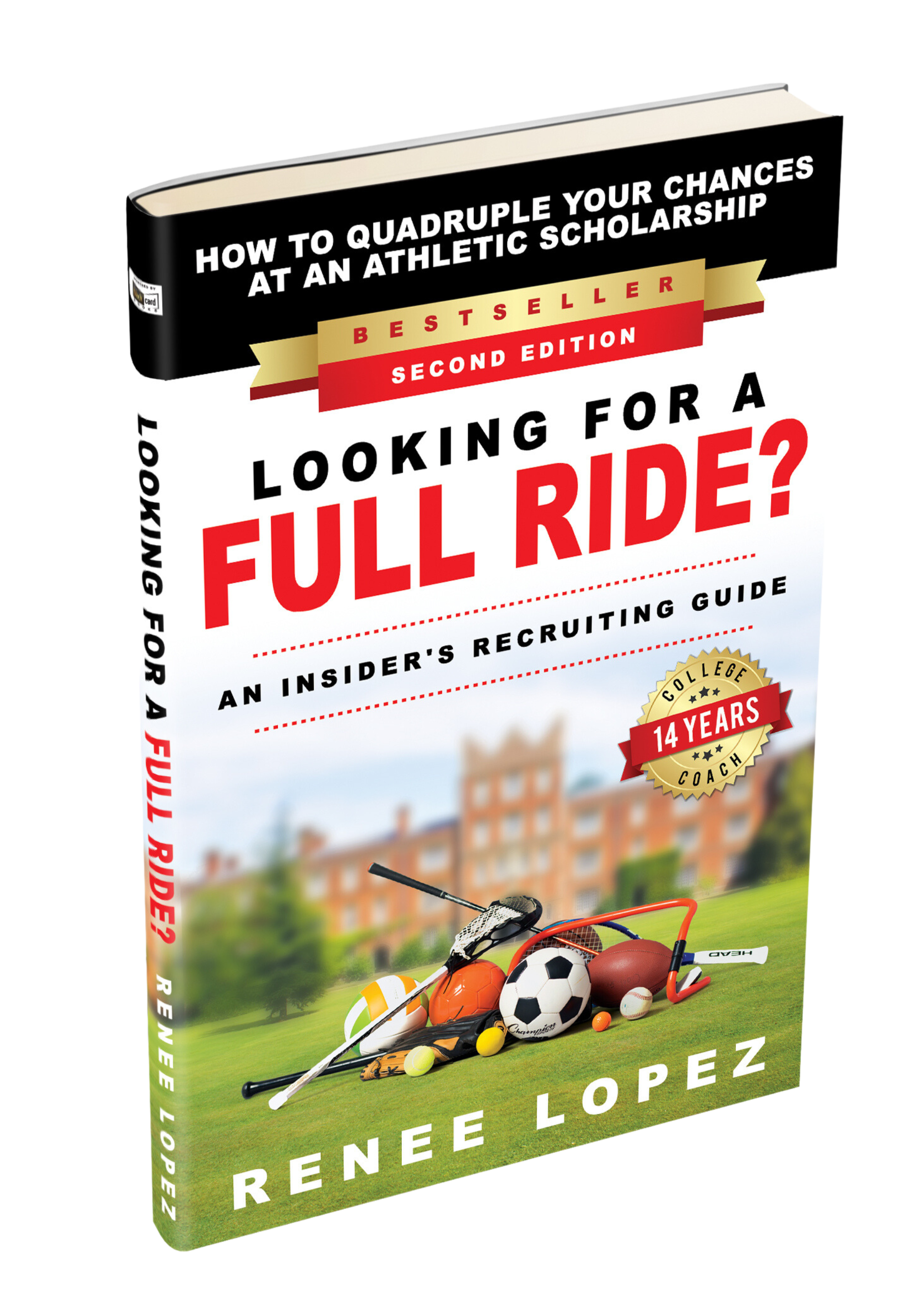One Aspect that Could Change Your Scholarship Opportunities
Height & Weight?
Grade Point Average & Test Scores?
Fitness Tests?
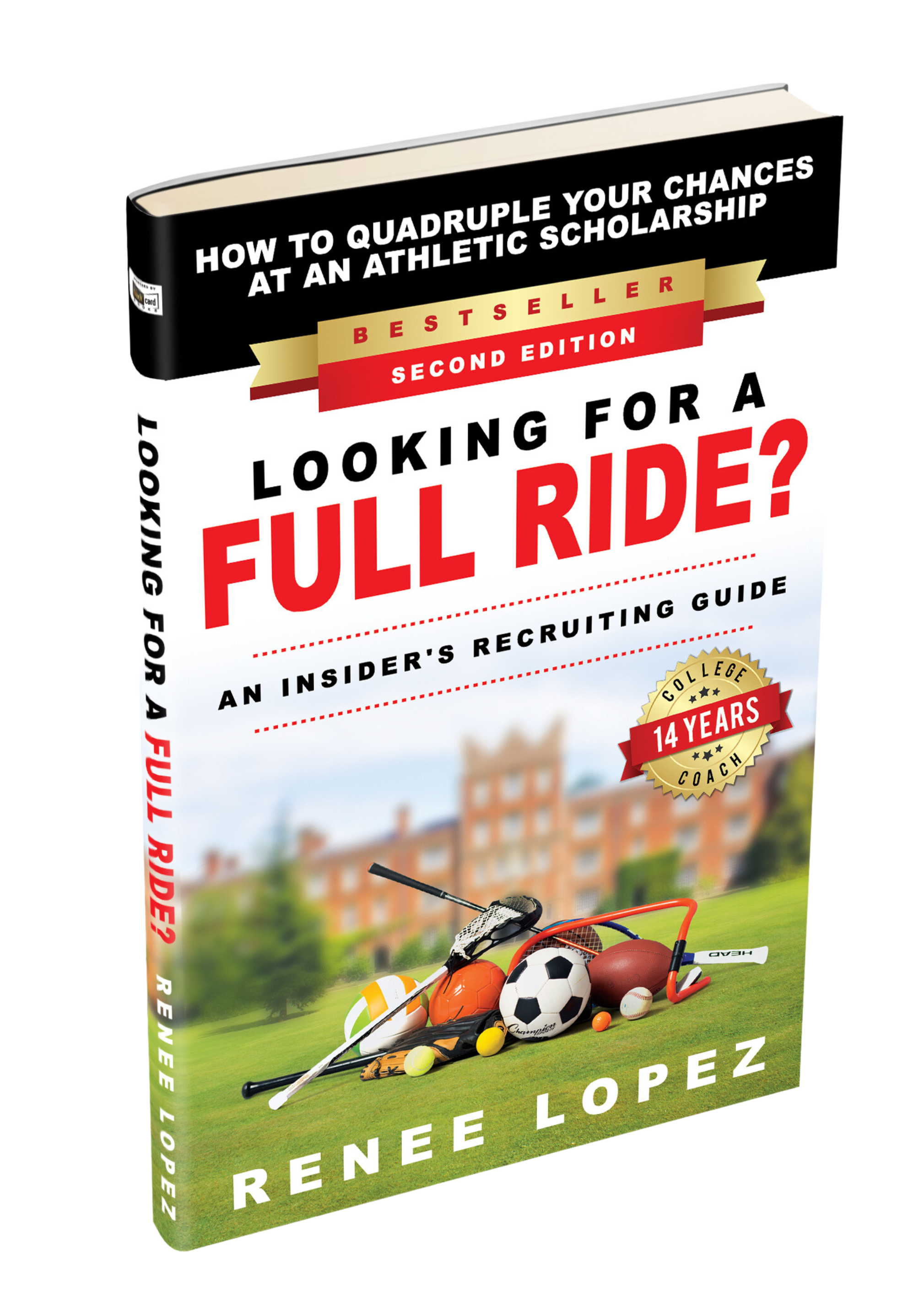 After interviewing over 65 college coaches and athletic directors for my book, Looking For A FULL RIDE?: An Insider’s Recruiting Guide, almost all of them spoke about those characteristics as being part of the process of researching potential recruits. I believe there are other 2 key areas student-athletes rarely realize college coaches evaluate in determining scholarship offers.
After interviewing over 65 college coaches and athletic directors for my book, Looking For A FULL RIDE?: An Insider’s Recruiting Guide, almost all of them spoke about those characteristics as being part of the process of researching potential recruits. I believe there are other 2 key areas student-athletes rarely realize college coaches evaluate in determining scholarship offers.
Coach Renee, what on earth should be prioritized above athletic talent and academic record? Having been a college coach for 14 years at all levels including NCAA DI, II, and NAIA, and combined with these 65 interviews, my experience and research have revealed two aspects. First, many college coaches want student-athletes who have resilience and can be confident in times of adversity. We discussed this in “How To Stay Confident When A College Coach Is Watching?”
Second, numerous college coaches spoke on the value of watching recruits over time (versus. just attending one competition) to evaluate your daily disciplines. Coaches want to know what you do daily, not only in being disciplined academically, but especially in your health.
 One of the reasons college coaches want student-athletes to attend camps is that it allows them the opportunity to see recruits in multiple settings and learn more about all aspects of an athlete. Will you take the proper steps to recover after a long day of camp? Did you seek out ice for that injury? What type of stretching did you do? What type of food choices are you making in the cafeteria lines? How have you hydrated yourself?
One of the reasons college coaches want student-athletes to attend camps is that it allows them the opportunity to see recruits in multiple settings and learn more about all aspects of an athlete. Will you take the proper steps to recover after a long day of camp? Did you seek out ice for that injury? What type of stretching did you do? What type of food choices are you making in the cafeteria lines? How have you hydrated yourself?
Wait, what? Yes, college coaches watch if you know how to properly hydrate yourself before, during, and after training. Especially for outdoor sports attending camps in the summer heat and humidity, we watch to see if you know how to take care of your body to perform at its best.
 Many of you reached out saying how much you appreciated our previous guest blog on Fueling Your Body, so I decided to again ask my colleague Jackie Slomin, a Sports Dietitian, who focuses on working with high school student-athletes, to offer information about proper hydration plans.
Many of you reached out saying how much you appreciated our previous guest blog on Fueling Your Body, so I decided to again ask my colleague Jackie Slomin, a Sports Dietitian, who focuses on working with high school student-athletes, to offer information about proper hydration plans.
“When do you start drinking water during practice and games?”
“When I feel thirsty,” is almost always the answer I hear regardless of what sport the athlete plays. Obvious answer, right?
However, one of the quickest ways for an athlete to ruin their performance is by not hydrating properly.
The Statistics
The scary part is that looking at statistics, the majority of youth athletes are dehydrated during practices, with some studies estimating dehydration regularly affects up to 75% of athlete’s during training. As many outdoor sports seasons are set to begin in August heat, the risk of being dehydrated is even higher, as the heat causes many athletes to increase their sweat rate.
So how exactly do we know what dehydration looks like? Typically, when an athlete ‘feels’ thirsty, it means that they are already on the way to being dehydrated. Even mild dehydration can cause fatigue, headaches and muscle cramping. Being proactive about fluid intake can make a BIG impact in performance, recovery, energy levels, and mental focus as well.
Every athlete should have a fluid plan to keep properly hydrated consistently throughout the day. Every athlete will have different needs depending their size, level of activity, sweat rate, and electrolyte losses throughout the day.
According to the 2004 Dietary Reference Intake (DRI), adequate intake for water is 16 cups for boys and 12 cups for girls before considering any physical activity. Athletes who train in hot, humid conditions, who are heavy sweaters (when you see and feel a white chalky residue on the skin– this is sodium and electrolytes being lost) or exercise for 2 hours per day, could need double of the recommendations. It’s no wonder so many athletes are constantly dehydrated– even if they don’t know it.
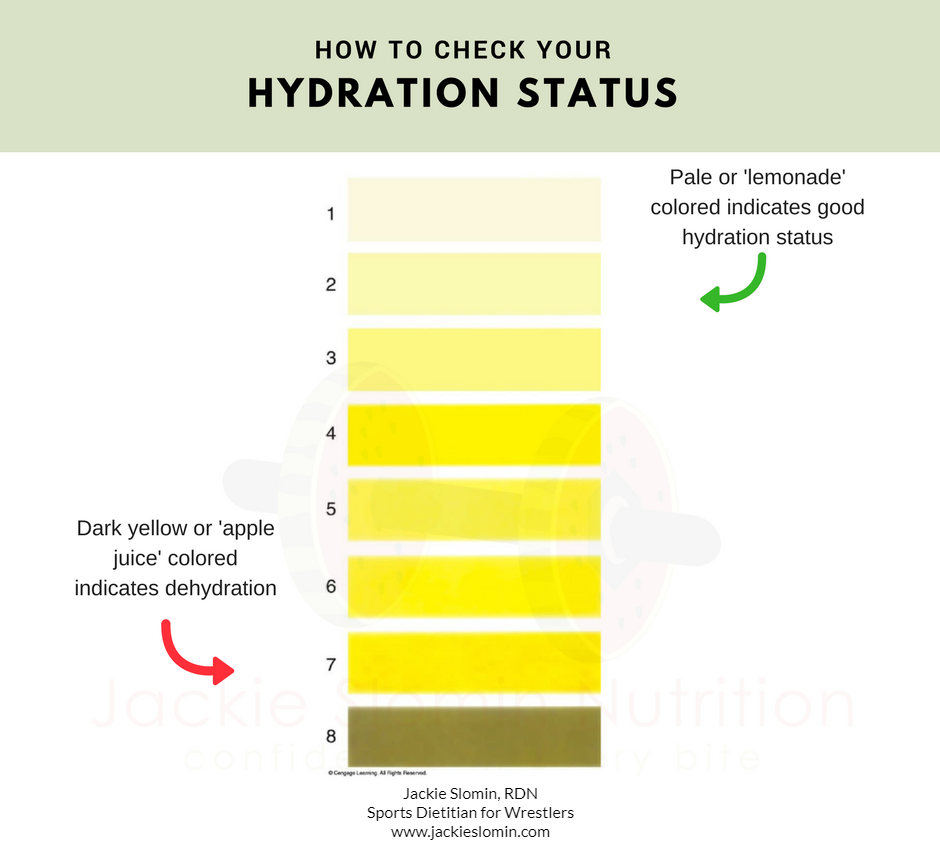 One way to solve this is to use the ‘urine check’ method. It’s simple: the lighter colored urine is, the better hydrated. A very pale, yellow color is typically considered well hydrated, while those who have a more amber, apple juice color are likely dehydrated.
One way to solve this is to use the ‘urine check’ method. It’s simple: the lighter colored urine is, the better hydrated. A very pale, yellow color is typically considered well hydrated, while those who have a more amber, apple juice color are likely dehydrated.
A few guidelines for hydration practices:
2-3 hours BEFORE exercise:
For every 10lbs your athlete weighs, aim to for them to consume 2oz of water. (100lb athlete will need about 20oz; while a 150lb athlete, 30oz)
DURING exercise:
If possible, hydrate with 4oz of water every 15 minutes. For most athlete’s, this is 1-2 big gulps. If it’s not plausible to take water breaks so often, then hydrating at the end of practice or a game will still have benefits. A one hour practice means they need around 16oz (about the size of a standard water bottle)
AFTER exercise:
An additional 16-20oz of fluids should be consumed within 2 hours of the end of training to top off fluids and ensure any water losses that have been lost were replaced.
Keep in mind, each athlete has different needs. While these recommendations are a good start, it isn’t a guarantee they will meet your athlete’s requirements nor should they be used if your athlete has any health conditions without first consulting their doctor or pediatrician. Individualized hydration plans based on an athlete’s unique sweat rate and water loss are a more accurate way to measure and create a hydration plan and can be conducted by a professional.
Dehydration affects many athletes, and unfortunately the method of ‘drinking when thirsty’ can often be too little, too late. By following a few simple recommendations and creating a hydration plan, you can perform without worry! Download your FREE hydration status assessment and Sports Drink vs Fluid guides here.
Want to learn more about the college recruiting process? See our blog “Common Misconceptions in College Recruiting.”
Want some help with the recruiting process? Join some of our 9 Facebook Groups:
- Parents of High School Student Athletes Walking Through The Process (All Sports)
- Beyond Xs & Os 4 HS Athletes: Health, Recruiting, Team Building, Mental Training (All Sports)
- Athletic Recruiting Education for Principals, AD's, and Counselors (All Sports)
- Club/HS Coaches Learning College Recruiting Process (All Sports)
- Play College Soccer (Soccer Specifically)
- College Recruiting for GK's (Soccer Specifically)
- Positive Team Building for Pro, College, HS, and Youth Coaches (All Sports)
- Mindset & Leadership Lessons for Athletes, Coaches/Teachers, & Business Leaders (All Sports & Business Leaders)
- Christian Competitors (Coaches & Athletes Serving Christ @Field/Court/Gym) (Sports Ministry for All)
Jackie Slomin
 Having previously worked with hundreds of NCAA Division I and II student-athletes from all different sports and having a graduate degree in sports nutrition and exercise science, Jackie Slomin is an expert at helping high school student-athletes discover how to improve their performance, energy, and recovery time by up to 50% with advanced sports nutrition principles that can be used by even the busiest of families. Jackie works with student-athletes, families, coaches, and teams to help them discover how to gain a competitive edge through nutrition. When Jackie isn’t working with athletes, she loves weight training, kayaking and trying new foods. You can contact her at info@jackieslomin.com and www.jackieslomin.com.
Having previously worked with hundreds of NCAA Division I and II student-athletes from all different sports and having a graduate degree in sports nutrition and exercise science, Jackie Slomin is an expert at helping high school student-athletes discover how to improve their performance, energy, and recovery time by up to 50% with advanced sports nutrition principles that can be used by even the busiest of families. Jackie works with student-athletes, families, coaches, and teams to help them discover how to gain a competitive edge through nutrition. When Jackie isn’t working with athletes, she loves weight training, kayaking and trying new foods. You can contact her at info@jackieslomin.com and www.jackieslomin.com.
Grab your FREE guide for building performance winning power snacks.
Would you like her to do individual consulting with your family to get an insider’s perspective?
Email info@lookingforafullride.com for more details.
Did you know Coach Renee Lopez can come to your school or sports organization?
Email info@lookingforafullride.com for more details.
Coach Renee Lopez
As a 17 year coaching veteran, Coach Renee Lopez is a recruiting expert for high school student-athletes. She uses her NCAA Division I, II, and NAIA Head Coaching experience to help families navigate the recruiting process to be identified by college coaches and help them find the right “fit” for playing at the next level. She has produced 3 All-Americans, over 30 All-Conference athletes and Her teams have been honored with awards for team academic accomplishments, sportsmanship, and sports ministry. In addition, Coach Renee Lopez has been named Coach of the Year by her peers.
She presents recruiting seminars across the country, has recently been featured in USA Weekly, with the National Alliance for Youth Sports, on SiriusXM Radio and ESPN Radio. She is the author of the book, Looking For A FULL RIDE?: An Insider’s Recruiting Guide where she has interviewed over 65 college recruiters across all sports and college levels. In addition, she runs 9 Facebook groups to help facilitate conversations on college recruiting education, coaching education, leadership development, and sports ministry. She is also a certified speaker, trainer and coach for the John Maxwell Team, Jon Gordon Company, 3Dimensional Coaching, and the Positive Coaching Alliance.
She also does private consulting for student-athletes and their families to help in understanding the often daunting process of recruiting. (See one family’s testimonial.) If you are looking for help in the college recruiting process, please email Coach Renee Lopez at info@lookingforafullride.com.
